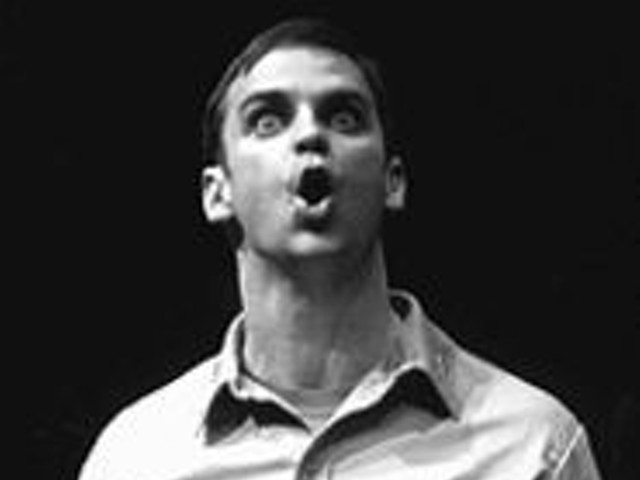Ever since Camille, disease has been a useful plot point in the theater, one that usually allows a protagonist to reveal glints of a heart of gold beneath a prickly exterior. But not Wit, which presents a complex central character whose extraordinary strength and resilience make for a mesmerizing evening. As New York magazine's John Simon wrote about the smash New York production: "The play is a battle of wits: the dubious know-how of the physicians against the wit (in both the modern sense and the old one of wisdom) of Vivian supported by Donne's metaphysical poetry." Repertory Theatre of St. Louis associate artistic director Susan Gregg is overseeing the local production -- which opens on Oct. 22 -- and finds that the sonnets add another layer of intricacy to the relationship between Vivian and her affliction. "What astonishes me is that it's not a disease-of-the-week play," she says. "I think this is the highest-quality writing I've seen in the last 20 years. It rivals (Tom Stoppard's) Arcadia in its complexity. For a director to get a piece like this is a gift."
According to Gregg, not only the actors in this production but also technical staff are engaged in reading Donne's work as an aid to understanding Edson's play: "With this poetry running through Vivian's brain all the time," she says, "we took on the daunting task of the 19 holy sonnets and figuring out where they resonate in the play." Usually the rehearsal process doesn't involve textual criticism as part of theatrical preparation. "I expect we'll play this ridiculous game through the production period," she says merrily. "What that's doing is beginning to lend the kind of texture to the production so those words aren't just recited poetry but also apply to behavior."
Indeed, the larger themes in Wit are counterpoint to Donne's poetry, which is ingeniously interwoven. "She's created an ivory tower with her poetry, and what that has allowed her to do is keep people at a distance," says Alison Edwards, who will play Vivian. "As the play progresses, and as the flashbacks happen, some of that defense goes away. It's a journey of humility."
As Wit unfolds, Vivian plays herself at the moment of diagnosis but also reverts to younger ages. We see her as a child learning to read and, at college age, hellbent on cracking the code of metaphysics. "I've tried to find the stages of naivete," says Edwards. "When you're 5, everything is exciting and interesting, and when you're in your college years, you have more intelligence and knowledge. One acting teacher said years ago that a 5-year-old is trying to act like they're 10, which is as grown up as they perceive grownups to be."
The play is essentially a tour de force for the actor playing Vivian; the character is onstage virtually without pause. Action revolves around her receiving treatment, discussing her progress and other medical matters that might not be in the normal theater-folk purlieu. Indeed, playwright Edson recommends "that an Oncology Certified Nurse be retained as a consultant for the production of this play." At the Rep, Pam Ostby, R.N., who manages the cancer center at St. John's Mercy Medical Center, has been sitting in on rehearsals to provide advice on handling the medical moments. "I think the play is a good blend of literature and medicine that probes into some of the questions cancer patients ask themselves when they're diagnosed with cancer at a terminal stage," she explains. "They've really tried to do their homework understanding how things work in the hospital. I think the audience will have been entertained, but it's a thought-provoking play and they'll come away feeling like they've been able to identify with some of the feelings that these people have."
The supporting characters in Wit include an avid young research doctor, Jason, who's more interested in the data that Vivian's responses to treatment provides; and Susie, Vivian's nurse, who's arguably the most compassionate person in the play. "Vivian, given her personality, is dealing with it the way she would deal with it and comes up with answers or comparisons to John Donne," says Ostby. "Susie is able to find that soft spot with her, and again I think that's what happens between nurses and patients. The nurse tries as best as she can to empathize with patients as far as the stages they're going through if they're diagnosed with cancer."
Both Edwards and Gregg say that Ostby's participation has been beneficial in the rehearsal process. "For me," says Edwards, "some of the things that were important were physical manifestations of the side effects from the chemotherapy, in terms of behavior and how much pain she'd be in. She's been helpful in tracking the progress of that and the treatment." Gregg concurs: "She's helped us understand about how cancer works, and the literal medical procedures that go on."
The conclusion of Wit involves an intricate and dramatic incident involving what's known in the medical profession as a "code situation." Ostby, who has an understandably critical eye when watching medical dramas on television, was impressed by how convincing this scene was in rehearsal. "They have to simulate doing CPR, and you could feel the adrenaline pumping like in a real code situation," she says.
For Edwards, the combination of Donne and medicine, theater and chemotherapy in Edson's work makes for a powerful and cunningly elusive part. "What Susan and I came up with is that it starts out as a lecture on what it's like to die of cancer, and in the process of teaching this lecture, Vivian takes this journey and learns truly what it's like to die of cancer, and actually what she learns is how to live."
And perhaps how to forgive -- which is a subject Donne grappled with in this sonnet: "If poysonous mineralls, and if that tree,/whose fruit threw death on else immortall us,/If lecherous goats, if serpents envious/Cannot be damn'd; Alas, why should I bee?" And Wit, like Donne, offers no easy answers.
A preview performance of Wit is given at 8 p.m. Thursday, Oct. 21; regular performances -- at 8 p.m. Tuesday-Friday, 5 p.m. every Saturday and 9 p.m. selected Saturdays, and 2 p.m. Sunday -- are presented Oct. 22-Nov. 7. Call the Rep box office at 968-4925 for tickets.





